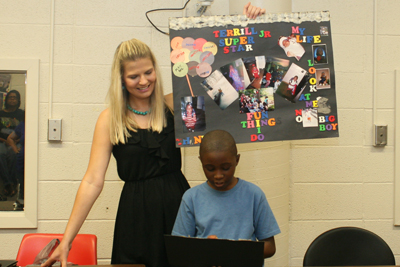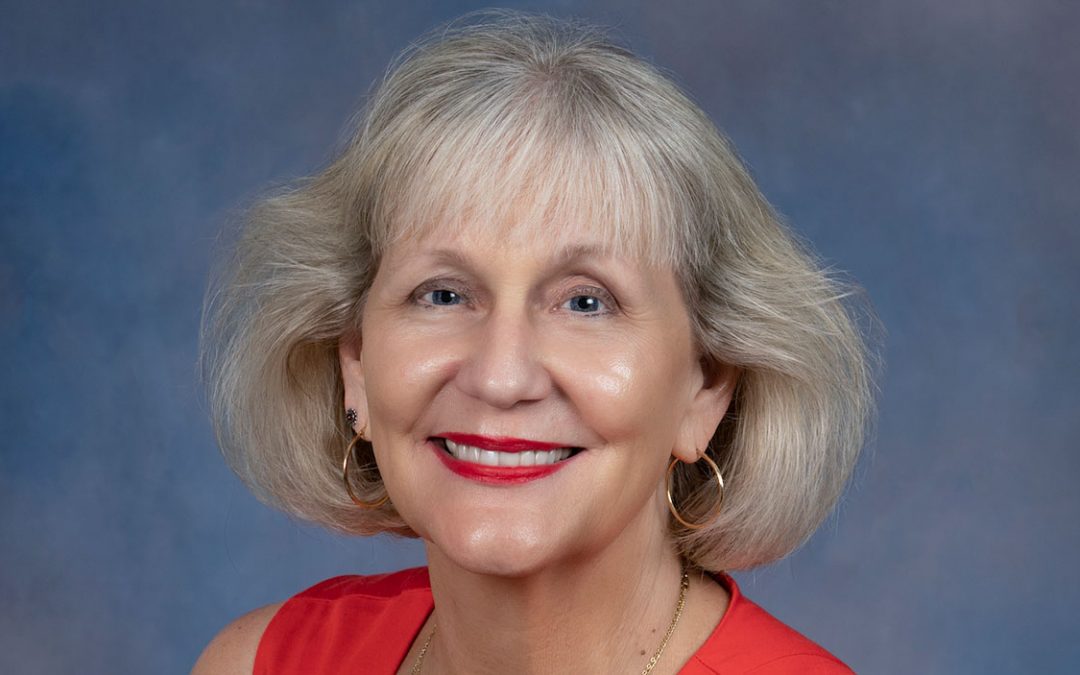
Nine-year-old Terrill Lyons Jr. reads his “I am” poem during the conclusion of the Richard W. Burnett Literacy Clinic at UMSL. His clinic teacher, Laurianne Zink, a master’s of elementary education student at UMSL and a teacher at Chesterfield (Mo.) Day School, holds a poster behind him. (Photo by Jennifer Hatton)
Nine-year-old Terrill Lyons Jr. stood in front of a crowded room in the basement of the Ward E. Barnes Library on the South Campus of the University of Missouri–St. Louis recently to recite a poem about himself.
“I am picnics and swimming,” Terrill read with a smile. “I am roses and St. Louis. I am chicken and rice.”
The “I am” poem was the conclusion of the Richard W. Burnett Literacy Clinic at UMSL. Terrill’s mother, Michelle, said the summer clinic has been amazing.
“It’s given him more confidence,” she said. “He’s more excited and interested in reading. He’s a stronger reader now and not afraid to try.”
The UMSL clinic is a collaborative learning site that prepares educators to teach literacy and to integrate literacy instruction across content areas. The clinic, which started in 1966, has been directed since 2006 by Rebecca Rogers, associate professor of literacy studies at UMSL. K-12 students are accepted into the clinic at no fee, but on a space-available basis.
Rogers said the clinic, which operates on a small endowment, includes several graduate courses for teachers who are pursuing their reading certification. These courses are taught by Rogers and several adjuncts, including Michelle Drake, a doctoral student and adjunct instructor who is learning to implement effective practices in literacy teacher education. The clinic courses are designed following evidence based practices for literacy education, reported on in a book written by Rogers in 2005 called “Critical Literacy/Critical Teaching: Tools for Preparing Responsive Teachers.”
Teachers in the clinic work either one-on-one or in small groups with students from the community on reading, writing, spelling and critical literacy.
“I typically try to push them (teachers) out of their comfort zone,” Drake said. “If they are used to teaching younger children, I’ll match them up with an older student. Since they are being certified to teach literacy to K-12, they need to have the diversity and I feel I would be doing them a disservice to allow them to stay in their ‘safe’ area. They always have a great experience and enjoy the opportunity to branch out and learn.”
Terrill participated in the summer clinic, an intense four-week program in which students meet four days a week with their teacher. Laurianne Zink, a master’s of elementary education student at UMSL and a teacher at Chesterfield (Mo.) Day School, worked with Terrill.
Teachers in the clinic use a variety of assessments to determine the reading, writing and spelling levels of the students. They develop an instructional program designed to accelerate the student’s literacy development. And parents and teachers work closely to communicate and help the student’s reading ability grow.
Rogers said the clinic is a great resource not only for the teachers and future teacher educators but for the parents and children throughout the community.
“Parents love the clinic,” she said. “Teachers really try to find out what the learning style of each student is and really make a connection with them. Once that happens, the teachers are able to work with each student to reach their potential. Parents are given a case study that documents their child’s strengths and growth in literacy which they can use to advocate for their.”
The clinic has three important components outside of the classroom, Rogers said.
“We have a multicultural book room, which is a great resource for both students and teachers,” she said. “Second we have extensive communication between the parents and teachers in the program and third, we have professional development programs offered to the community, focusing on literacy. Each year we host a literacy, language and culture speaker series with internationally recognized speakers in the field of literacy studies.”














